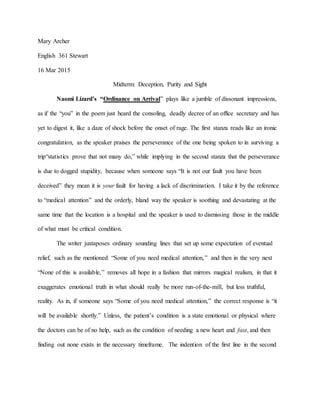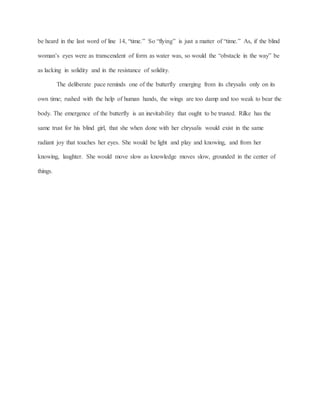The summary analyzes a poem called "Going Blind" by Rainer Maria Rilke. It notes that the poem is about a speaker who carefully observes a blind woman at a party. The speaker notices subtle differences in how she holds her cup that indicate her blindness. The summary then analyzes several aspects of the poem, including how Rilke equates the woman's eyes to water to remove any harshness, and how he deliberately paces the description of her movements to contrast with the quicker movements of others at the party. It concludes by discussing how Rilke's deliberate pacing reminds the reader of a butterfly emerging from its chrysalis in its own time.


![What the patient may rail against is the speaker’s insensitivity, engaging in small talk the
kind that seems to herald relief from some great, long struggle, as once a journey is completed
and the goal is in reach the person there ought to say “you’ve made it,” and here are your
comforts, like “a bath, a hot meal, a good night's sleep,” and instead the revelation is none will
be coming. What seemed to be a welcome to journey’s end was banal chatter to fill the banal air.
And to add insult to injury, the final word is the deception is “not [their] fault,” like the speaker
had just deceived the patient into hope. The reader on some level is aware of having at some
point been deceived, and a sense of bafflement and resentment arise while the nice wish of
“condolences” is said just as the speaker denies any sense of being the injuring party, and so the
poet, Lizard, recreates the sense of being a powerless patient unable to connect injury with the
one injuring because of the rhetoric. So the poem, at first seeming illogical because of the pairing
of phrases that don’t follow each other in practice, creates a deliberate sense of what it feels like
to be hoodwinked.
Mary Oliver’s “Wild Geese” at first glance bears similarity to “Ordinance on Arrival”
in the use of “you” to address the imagined audience of the poem. The audience seems to be the
universe at large, or whosoever is lonely in the boundaries of his skin and needs to be re-
welcomed into the body of the world, infinite in imagination and infinite in comfort for the one
who forgets he is rich in natural things, like his own unfailing beauty.
The speaker is one who says with kindness to reject the thought of inner lack of good,
with “You do not have to be good” meaning there doesn’t have to be a bad to be a good, that is,
good just exists alone. Oliver sees a simplicity in nature that has no concern with dichotomies, as
“Meanwhile the world goes on,” at home in itself, and the great gifts of “sun and the clear
pebbles of the rain” give of themselves unhesitatingly. The speaker finds strength in nature that](https://image.slidesharecdn.com/5324231d-a25c-4c5b-83a6-be96c06fb562-150812085829-lva1-app6892/85/ENG361Midterm-3-320.jpg)

![would likely have said, “If only I had not transgressed,” and he would give the word “only” the
tightness a man fighting against himself would feel in his chest. Second, the word “lonely” has
the same ‘o’ sound as “home.” The home the geese head towards said in the line just previous to
the “lonely” line, is where the lonely one, whoever he is, would likely find the traces of a smile,
because he would be letting “the soft animal of [his] body love what it loves.” Lastly, the
“lonely” sound carries inwards to “over and over announcing your place.” The sense of “lonely’
is that no one is coming. The delight of “over and over” is that someone, in this case the natural
world, is already at your door and will persist in trying to call one back to all that’s “harsh and
exciting.”
When I reach the word “family” at the last of the poem, my mouth lifts, my brows unknit,
and overall a softening effect occurs. I think the word sounds like the “animal” in “soft animal,”
having all the letters besides ‘n.’ Also, the ‘f’ is both in the word “family” and “soft.” The word
“soft” has a special resonance in the poem and I think this in part may be why. By the familiarity
in sound, the words “family” and “animal” come to mean what is good and pure about the world,
as the associations of “family” as security and happiness transfer over to the word “animal” and
give the animal world the connotation of being a human home. Also, the concept of animals
being sinless and without evil carries over to the word “family,” and lends the pure essence of
animals to humans, who unfortunately thinks evil about itself.
Ranier Maria Rilke’s “Going Blind” is a poem about patience, as the speaker’s careful
observation cues him into the blindness of a woman at a party with the subtle difference in the
way she holds her cup. The speaker must give her notice, and pay attention to the area where
most would figure she was lacking, and find the sight within physically unseeing eyes. To this
end, Rilke gives a pair of blank eyes animation with the “light played as on the surface of a](https://image.slidesharecdn.com/5324231d-a25c-4c5b-83a6-be96c06fb562-150812085829-lva1-app6892/85/ENG361Midterm-5-320.jpg)

